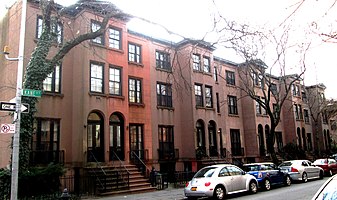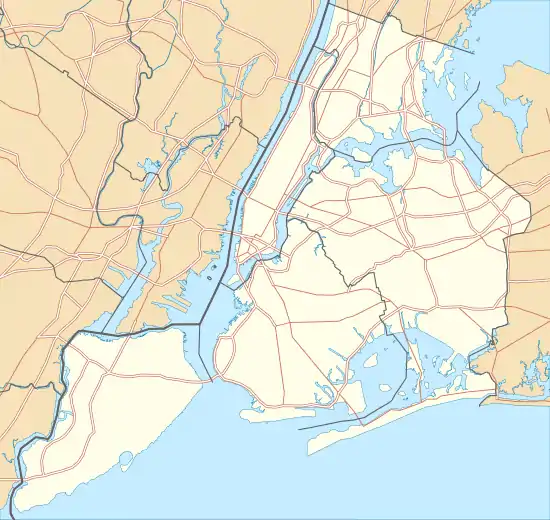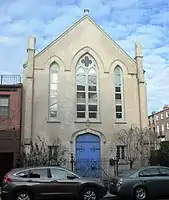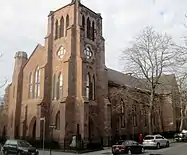Cobble Hill Historic District | |
 Rowhouses on Kane Street between Clinton Street and Tompkins Place | |
   | |
| Location | Roughly bounded by Atlantic Avenue, Court, Degraw and Hicks Streets Brooklyn, New York City |
|---|---|
| Coordinates | 40°41′21″N 73°59′47″W / 40.68917°N 73.99639°W |
| Area | 60 acres (24 ha) |
| Built | 1830s - 1920s |
| Architect | various |
| Architectural style | Greek Revival, Italianate, Queen Anne, etc. |
| NRHP reference No. | 76001225[1] |
| Significant dates | |
| Added to NRHP | June 11, 1976 |
| Designated NYCL | December 20, 1969[2] extension: June 7, 1988[3] |
The Cobble Hill Historic District is a municipal and national historic district located in the Cobble Hill neighborhood of Brooklyn, New York City. The national district consists of 796 contributing, largely residential buildings built between the 1830s and 1920s. It includes fine examples of Greek Revival, Italianate, and Queen Anne style row houses. Also in the district are a number of notable churches, including ones by Richard Upjohn (Christ Church, 1841–42) and Minard Lafever (St. Francis Cabrini Chapel, originally Strong Place Baptist Church), 1851–52). A number of early 20th century apartment buildings are part of the district as well.[4]
The Cobble Hill Historic District was first designated a New York City landmark by the New York City Landmarks Preservation Commission in 1969.[5] It was then listed on the National Register of Historic Places in 1976.[1] The city extended the district in 1988.[5]
Gallery
 33 & 35 Strong Place between Degraw and Kane Streets, part of a set of seven Queen Anne rowhouses (1891)
33 & 35 Strong Place between Degraw and Kane Streets, part of a set of seven Queen Anne rowhouses (1891) Old St. Paul's Roman Catholic Church by Gamaliel King (1838, with later additions)
Old St. Paul's Roman Catholic Church by Gamaliel King (1838, with later additions) Congregation Baith Israel Anshei Emes, the oldest Jewish congregation in Brooklyn, built as Middle Dutch Reformed Church (1855–56)
Congregation Baith Israel Anshei Emes, the oldest Jewish congregation in Brooklyn, built as Middle Dutch Reformed Church (1855–56) The South Brooklyn Seventh-Day Adventist Church by Theobald Engelhardt, built as the Trinity German Lutheran Church (1905)
The South Brooklyn Seventh-Day Adventist Church by Theobald Engelhardt, built as the Trinity German Lutheran Church (1905) "Workingman's Cottages" built by philanthropist Alfred Tredway White as low-cost housing (1876)
"Workingman's Cottages" built by philanthropist Alfred Tredway White as low-cost housing (1876) Christ Church and Holy Family Episcopal Church by Richard Upjohn (1841–42)
Christ Church and Holy Family Episcopal Church by Richard Upjohn (1841–42) Strong Place Baptist Church by Minard Lafever, later St. Francis Cabrini Roman Catholic Chapel, now apartments (1851–52)
Strong Place Baptist Church by Minard Lafever, later St. Francis Cabrini Roman Catholic Chapel, now apartments (1851–52)
See also
References
- 1 2 "National Register Information System". National Register of Historic Places. National Park Service. March 13, 2009.
- ↑ "Cobble Hill Historic District Designation Report" New York City Landmarks Preservation Commission (December 30, 1969)
- ↑ "Cobble Hill Historic District Extension Designation Report" New York City Landmarks Preservation Commission (June 7, 1988)
- ↑ Ezequelle, Betty J.; Ralph, Elizabeth K. (n.d.). "National Register of Historic Places Registration:Cobble Hill Historic District". New York State Office of Parks, Recreation and Historic Preservation. Retrieved 2011-03-12. See also: "Accompanying 33 photos".
- 1 2 New York City Landmarks Preservation Commission; Dolkart, Andrew S.; Postal, Matthew A. (2009). Postal, Matthew A. (ed.). Guide to New York City Landmarks (4th ed.). New York: John Wiley & Sons. ISBN 978-0-470-28963-1., pp236-37

